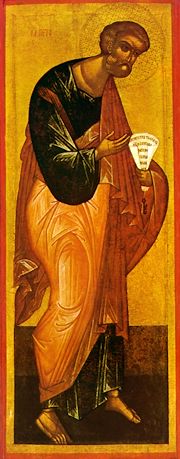Difference between revisions of "Apostle Peter"
m (Reverted edit of 212.202.50.68, changed back to last version by ASDamick) |
|||
| Line 1: | Line 1: | ||
[[Image:Apostle Peter.jpg|right|frame|St. Peter]] | [[Image:Apostle Peter.jpg|right|frame|St. Peter]] | ||
| − | The holy, glorious and all-laudable '''Apostle Peter''' | + | The holy, glorious and all-laudable '''Apostle Peter''' is the leader of the twelve [[apostles]] of [[Jesus Christ]]. His feast is celebrated on [[June 29]]. |
==Life== | ==Life== | ||
| − | The divinely-blessed Peter | + | The divinely-blessed Peter was from Bethsaida of Galilee. He was the son of Jonas and the brother of [[Apostle Andrew|Andrew]] the First-called. He was a fisherman by trade, unlearned and poor, and was called Simon; later he was renamed Peter by the Lord Jesus Christ himself, who looked at him and said, "Thou art Simon the son of Jonas; thou shalt be called Cephas (which is by interpretation, Peter)" (John 1:42). |
| − | On being raised by the Lord to the dignity of an Apostle | + | On being raised by the Lord to the dignity of an Apostle and becoming inseparable from him as his zealous disciple, he followed him from the beginning of his preaching of salvation up until the very Passion, when, in the court of Caiaphas the high priest, he denied Him thrice because of his fear of the Jews and of the danger at hand. But again, after many bitter tears, he received complete forgiveness of his transgression. After the Resurrection of Christ and the descent of the Holy Spirit, he preached in Judea, Antioch, and certain parts of Asia, and finally came to Rome, where he was crucified upside down by Nero, and thus he ascended to the eternal habitations about the year 66 or 68, leaving two Catholic (General) Epistles to the Church of Christ, known as [[I Peter]] and [[II Peter]]. He is also generally regarded as being the primary source (i.e., in interview) for the material recorded in the [[Gospel of Mark]]. |
==Sources== | ==Sources== | ||
Revision as of 12:16, April 21, 2005
The holy, glorious and all-laudable Apostle Peter is the leader of the twelve apostles of Jesus Christ. His feast is celebrated on June 29.
Life
The divinely-blessed Peter was from Bethsaida of Galilee. He was the son of Jonas and the brother of Andrew the First-called. He was a fisherman by trade, unlearned and poor, and was called Simon; later he was renamed Peter by the Lord Jesus Christ himself, who looked at him and said, "Thou art Simon the son of Jonas; thou shalt be called Cephas (which is by interpretation, Peter)" (John 1:42).
On being raised by the Lord to the dignity of an Apostle and becoming inseparable from him as his zealous disciple, he followed him from the beginning of his preaching of salvation up until the very Passion, when, in the court of Caiaphas the high priest, he denied Him thrice because of his fear of the Jews and of the danger at hand. But again, after many bitter tears, he received complete forgiveness of his transgression. After the Resurrection of Christ and the descent of the Holy Spirit, he preached in Judea, Antioch, and certain parts of Asia, and finally came to Rome, where he was crucified upside down by Nero, and thus he ascended to the eternal habitations about the year 66 or 68, leaving two Catholic (General) Epistles to the Church of Christ, known as I Peter and II Peter. He is also generally regarded as being the primary source (i.e., in interview) for the material recorded in the Gospel of Mark.
Sources
Categories > Church History
Categories > Church History
Categories > Church History
Categories > Church History
Categories > Liturgics > Feasts
Categories > Liturgics > Feasts
Categories > Liturgics > Feasts
Categories > Liturgics > Feasts
Categories > People > Clergy > Bishops
Categories > People > Clergy > Bishops > Bishops by century > 1st-century bishops
Categories > People > Missionaries
Categories > People > Saints
Categories > People > Saints > Biblical Saints
Categories > People > Saints > Martyrs
Categories > People > Saints > Saints by century > 1st-century saints
